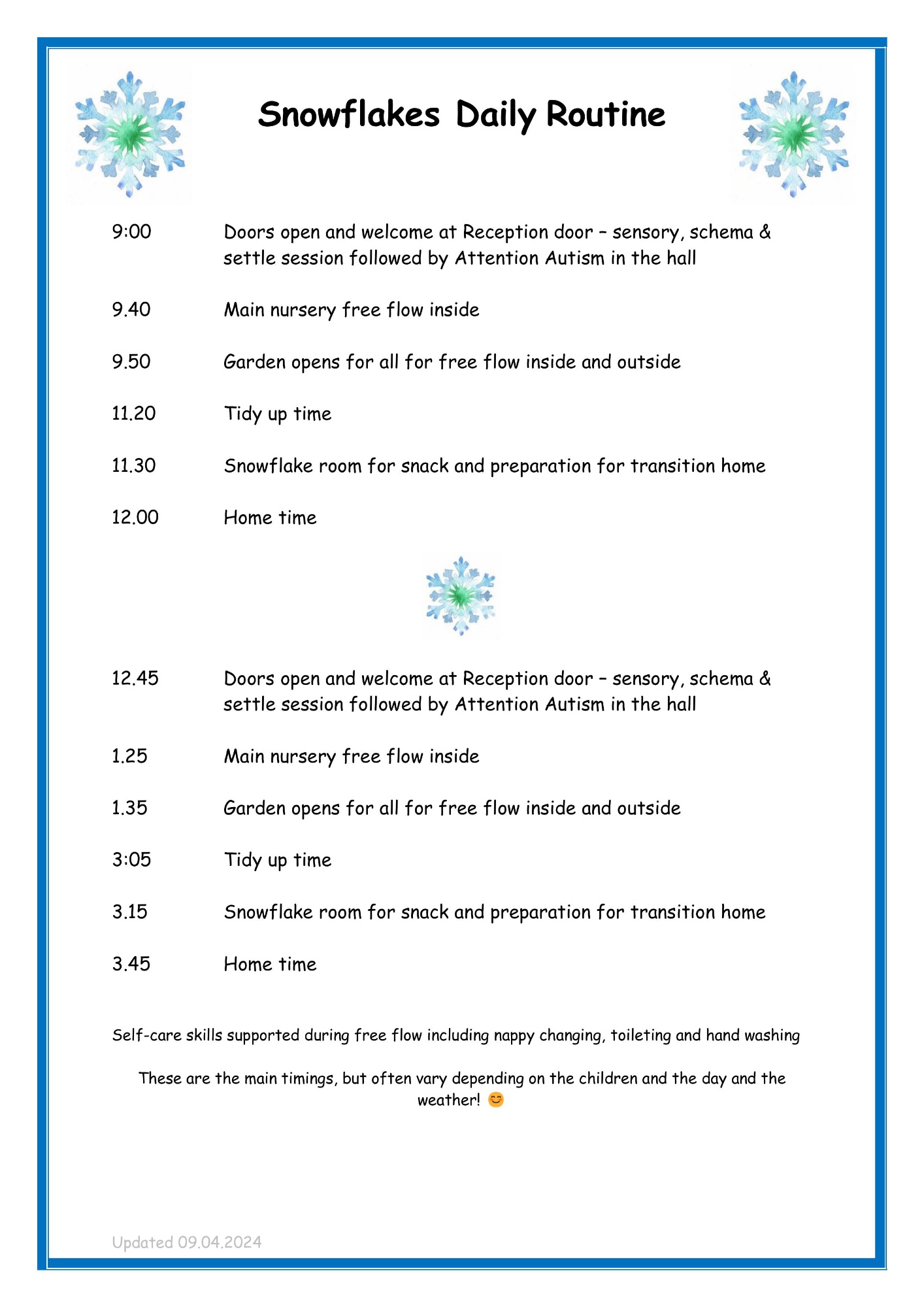- Reading Early Years Schools Federation
- Home
- About Us
- Our Classes
- Snowflake Social Communication Resource - 15 hour
Snowflake Social Communication Resource - 15 hour

The Snowflakes specialist resource caters for children who have a social communication need. Children will be considered for a placement where they will benefit from a high level of support, normally 1:1 or 1:2 with skilled practitioners. Children in the Snowflakes resource benefit from a combination of: Speech and Language therapy; Occupational Therapy; access to a low arousal environment; a personalised sensory diet and supported access to a mainstream curriculum that is differentiated to meet their individual needs.
Children who are already based at New Bridge Nursery School will not automatically be prioritised for a placement in the resource. Children from across Reading Borough Council will be considered equally for a placement based on needs.
Admission is through a multi-agency panel and is based on the child’s needs and circumstances; the current cohort of children attending the resource base and whether the admission of a new child will still ensure that all children attending the base are supported to meet their educational needs.
Children considered for admission to the Snowflakes resource will:
- Have Social Communication Difficulties as their primary need.
- Not be diagnosed with a Speech & Language disorder
- Not have Profound and Multiple Learning Difficulties (PMLD) as their primary need.
- Not have Hearing Impairment/Visual Impairment/Multi Sensory Impairment as their primary need.
Children identified for application to the resource will usually be known to support services e.g. Portage & Educational Psychologist Service, Early Years SEND Advisory Service & Speech and Language therapists and their views will be sought in considering the admission request.
Before an admission request is brought to panel, the family will be invited into the resource for a show-round and initial assessment visit where staff from the resource will meet with parents/carers and observe the child to gather information to assist in the panel in their consideration of whether Snowflakes is an appropriate placement.
The progress of children in the Snowflakes resource will be reviewed. The review will consider whether the social communication resource is effective in meeting the child’s needs or whether any of the exit criteria have been met.
Admissions Indicators:
The indicators that the admissions panel will be taking into consideration when deciding if a placement at the Snowflakes Early Years Social Communication Base is suitable for a child will include:
- Child needs a high level of support to be able to access a highly differentiated curriculum.
- Child needs a high level of support from familiar key person to engage in the fundamentals of communication e.g.
- Giving and sharing attention with another person
- Turn Taking in exchange of behaviours
- Understanding and using eye contact, facial expressions, nonverbal gestures and use of physical contacts.
- Learning how to use vocalisations and understanding variations and meaning
- Child shows signs of anxiety about what is expected of them; requiring visual cues and adult support to follow the routine and follow simple step instructions.
- Child requires sensory support to manage the day to day routines and may demonstrate sensory seeking or sensory avoidance behaviours
- Child needs a high level of support to emotionally regulate
- Child needs a high level of support to engage in joint attention on an individual basis using techniques such as Intensive Interaction
- Child’s play needs support from an adult for child to participate, and child needs support to move to another activity.
Transition to Mainstream Classroom/Exit Criteria indicators:
The list below are indicators for when a child within the Snowflakes resource has made progress and could have their needs met in a mainstream Early Years setting with appropriate support.
Communication
- Shows communicative behaviour to request using a range of means (verbal, symbols, actions) to express some wants/needs
- Aware of objects/visual cues and that they carry meaning.
- Approaches familiar person to communicate.
- Follows simple instructions with visual support.
- Starting to use speech for a range of functions- greetings/ requests/ choices/ comments, especially in small group situations.
Social Interaction and play
- Shows motivation to interact with others and can engage in social cues with support e.g. waiting for a turn; responding during a gap in conversation in small group situations.
- Able to engage in shared attention group activity with key adults.
- Can wait a turn in a structured small group with adult support.
- Demonstrates use of functional visual communication gestures/eye contact in appropriate situations.
Routines
- Able to adapt to a familiar environment with visual prompts and adult support.
- Able to change activity with appropriate visual support such as a now/next board.
- May use a visual support system or cues to access and complete activities or sequences.
- Demonstrate some awareness of needs and will make these needs known in a consistent manner.
Sensory Regulation
- Able to engage in a programme of sensory support including calming techniques and movement breaks e.g. Accept physical comfort from familiar caregiver; soothed by touch; comforted by familiar items;
- Able to show engagement with support to focus and manage sensory experiences in the background environment.
Children attend our 15 hour sessions five days each week, either 5 mornings or 5 afternoons.
Morning Session 9:00am - 12:00pm
Afternoon Session 12:45pm - 3:45pm
Admission to the unit is via a panel process, detailed in our admissions policy. We follow the Reading Early Years Schools Admissions Policy.

